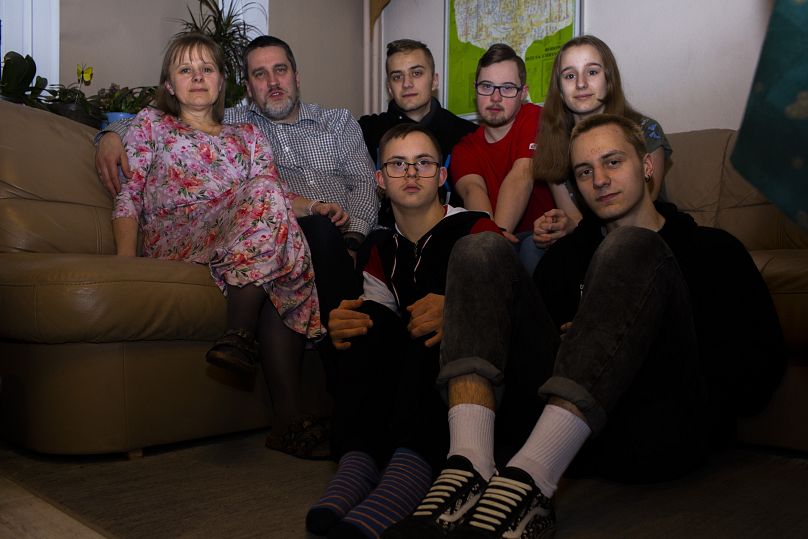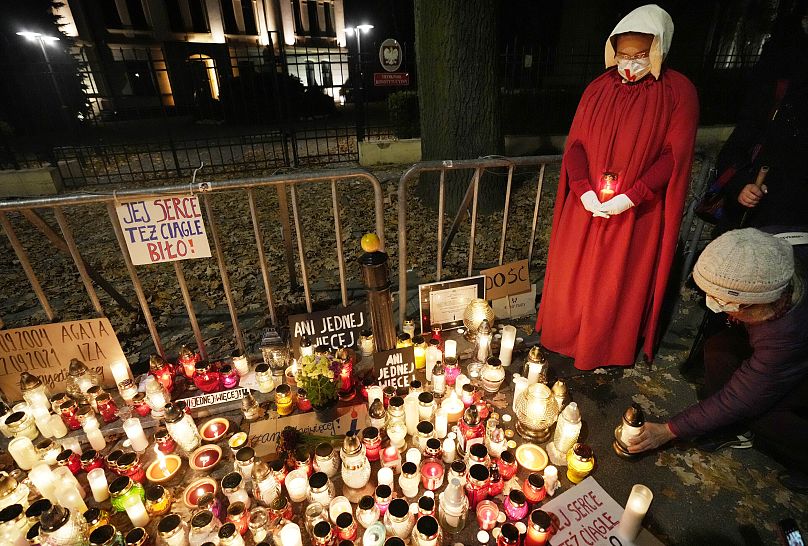One side says "every life is precious" while the other claims Poland's tighter abortion laws are putting women's health in danger.
It's a year since Poland's near-total abortion ban came into effect.
To mark the anniversary, Euronews has been speaking to people on both sides of a debate that has polarised the country.
The background
Poland already had some of the strictest abortion laws in Europe. But in October 2020 they were tightened further.
Previously abortions were allowed in three cases: if the pregnancy was a result of rape, if the woman’s life was at risk, or if the fetus had clear signs of severe disease.
The new law, which came into effect on 27 January 2021, means abortions are now only available in cases of rape or if the mother’s life is at risk.
The case for tighter abortion laws: 'Every life is precious'
In a cramped living room on the very edge of the Polish capital Warsaw, Marta Witecka and her husband Andrzej Witecki sit down to talk with Euronews.
They are among the Poles -- predominantly Catholic -- who are in favour of the stricter abortion rules.
Their apartment would fit most families, but it looks small when all their five children are gathered in the living room.
Their second son, Szymon, was born with Down's syndrome. Jakub, a foster child, has the same genetic disorder.
Another of their children, Estera, who had Edwards' syndrome -- a genetic disorder that causes severe disability -- died shortly after being born.
Parents Marta and Andrzej believe abortion is a crime against the unborn.
“They say that it is not a child, [that] it is just a couple of body cells in your belly, so you decide," said Marta.
"We do not think that it is your decision. You have to cope with it, to let it live the life that it was given with dignity. And if it has to die, okay, it has to die, but I am not one to decide when or how. Life is precious and they claim that it is their body, but it is a separate life and person.”
Opponents of the stricter abortion law say it was responsible for the death of a 30-year-old pregnant woman, named Izabela, who died from septic shock in September last year. Activists claim her doctors did not carry out a life-saving abortion, waiting instead for the foetus to die because of the legislation.
But lawyer and psychologist Magdalena Korzekwa-Kaliszuk, president of Proelio Group Foundation, doesn't agree. She says the abortion legislation had nothing to do with the woman's death and the law already allows abortion if the child is a danger to the mother's life.
She argued that while there might be risks associated with getting an abortion illegally, the rights of the child to live outweighs the mother's will to abortion.
"Abortion also comes with risks, so the best way to protect the mother is obviously to convince women not to abort and to support them in many ways, financial support, psychological support and so on. So that even in the worst situation, the woman will not do an illegal abortion, but instead give the baby up for adoption.”
The case against tighter abortion laws: 'We already have confirmed deaths'
The threat of tighter abortion laws has sparked protests in recent years. They have intensified since the near-total ban came in a year ago.
Aleksandra Owca, a lawyer from Krakow, has been among those demonstrating.
“I have been going to the protests since 2016, but I have been more involved during the last two years,” she told Euronews. "I think it [the near-total ban] was the breaking point for many people, where we realised that we could not just wait for another election. That these things can’t just be decided above our heads without our involvement.”
Aleksandra believes that the principle and concept of freedom of choice has been violated by the new law. She fears more restrictive abortion regulations will harm women.
“We already have confirmed deaths from this law," she claimed. "There was a woman in the hospital who was refused help because of the law. And she [Izabela] died. I feel like it is not loud enough in Poland because we are already so angry."
Activists claim the case of Izabela shows the law has had a chilling effect on doctors.
"So women now in Poland, they are afraid to get pregnant," said Urszula Grycuk, international advocacy coordinator at the Federation for Women and Family Planning (Federa) in Poland.
"We deal with a lot of cases that are close to Izabela. It's deeply worrying that instead of taking it as a warning, as a very alarming case that never should happen again, some doctors show this level of fear. And they should just do their job.
"On an everyday basis, we have cases of women who are not afforded necessary abortion or pregnancy care. It is about pregnancy care, not about abortion care any more because their life and their health are not protected."













